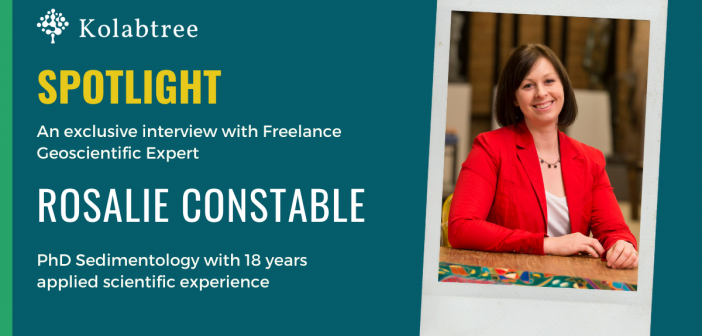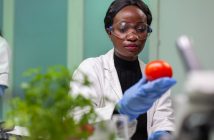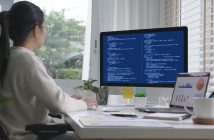Kolabtree’s freelance geoscientist Rosalie Constable on the rise of remote working and the gig economy, and her experience as a woman working in a typically male-dominated geoscience sphere.
A geoscientist with 18 years of applied scientific experience, Dr. Rosalie Constable has a PhD in Sedimentology and basin research, building on this by carving out a strong research and applied science background in the oil and gas industry. As a freelance geoscientist on Kolabtree, she takes on energy, environment and renewables projects, using her knowledge of geological risk and hazard mitigation to simplify and present complex scientific concepts to diverse audiences
As part of the ‘Spotlight’ series, I had the chance to interview Rosalie in order to understand her niche areas of expertise, personal journey and what motivated her to start offering on-demand expertise as a freelance geoscientist on Kolabtree.
NM: How did you get into science? Tell us about your research/industry experience
RC: I have always had a love of the natural world – I grew up in a rural community in Australia around lots of animals and loved being out in the bush. And I have always been quite logical and pragmatic and love solving problems and continually learning, so a career in the natural sciences was an obvious choice.
I started my science degree at the University of Adelaide with the intention of doing biological sciences, such as zoology or marine biology, but I happened to do geology in first year and loved it. I like that earth science brings together all the main science disciplines – biology, chemistry, physics – to try to understand the earth as a total system.
Adelaide has a department that specialises in energy geoscience, and the oil and gas industry seemed to provide a great opportunity to get paid to travel the world and work with people from different backgrounds and cultures. So I did my post-graduate degrees focusing on sedimentology and basin analysis techniques applied to oil and gas exploration and production, which fitted with my love of logical problem solving.
Since graduating, I’ve been lucky enough to work for several types of companies: research, large multinational, and a small start-up. Projects I’ve worked on have been based all over the world, with the opportunity to work in different roles, each with their own particular set of challenges. One thing I reflect on regularly is how no two days ever seem to be the same. One day may be analysing results from a well drilled before I was even born, the next day I might spend reviewing a contract or tender with the lawyers, or leading a workshop discussion on stratigraphy with a diverse team of geoscientists.
As I now make the step into consulting, I think this diverse range of experiences gives me a good understanding of how geoscience fits into the business world, enabling me to provide very focussed and fit-for-purpose solutions.
NM: What are some things that you feel have shaped your career as a geologist so far?
RC: I have been incredibly lucky to have had great mentors and advocates in each of my roles – people who probably saw my capabilities more clearly than I did! And they helped me (and pushed me!) to step out of my comfort zone to do new things, take on more responsibilities, and expand my skills and experience. So they are probably the biggest influence on my career so far.
As a geologist, the more outcrops and datasets you see and work on, the greater your ability to draw on that experience to unlock the stories of the subsurface. Geologists are essentially detectives, needing to identify and piece together small bits of evidence to determine what is going on beneath our feet. So getting out in the field regularly, and working on different types of projects, helps develop your ability to think of multiple scenarios and draw on a wide range of experiences when building your models.
NM: What prompted you to join Kolabtree?
RC: I finished working for my previous company in mid-2020 and wanted to do something a bit different, rather than going back to a staff role in an oil company. So, I decided to set up as a consultant with more of a focus on energy transition, sustainability and renewable energy. A friend suggested I look at Kolabtree as a freelance site for scientists, so I decided to sign up as a freelance geoscientist for the chance to work on some different types of projects.
NM: What kind of projects do you enjoy the most?
RC: Since I started working as a consultant, all of the projects have been really different, but all have required problem solving and learning something new, which is at the heart of what I love to do. I’ve also been able to get involved in low carbon, sustainability and renewable energy projects, which was the key driver behind my move to start consulting, and this has been a great learning experience.
I’ve also had a few clients return to me and request I work on subsequent phases of their project, so it’s great to have been able to build trust and get to know a client and their project in a bit more detail.
NM: Do you think the rising trend of remote collaboration is here to stay? Or are we simply looking at a temporary trend due to the lockdowns?
RC: I definitely think remote collaboration is here to stay. It was already starting to become more common – we regularly worked with remote consultants in my previous company – but it is now much more widely accepted and has made many people realise how much can be achieved when teams work remotely. The lockdowns also forced a lot of companies to implement the hardware and software systems to make remote work possible, so I expect it will continue to be widely used. Speaking as a freelance geoscientist, remote collaboration suits my style of working, so I’m happy it’s more widely accepted now!
In addition to remote collaboration, the so-called “gig economy” seems to be expanding into more sectors now too. For start-ups and small businesses, platforms like Kolabtree are a great way to connect with qualified and experienced scientists who can help rapidly progress their ideas without the commitment and expense of hiring a specialist or big consultancy firm. I expect this could help drive innovation too, as testing ideas doesn’t necessarily have to come with huge upfront time and cost commitments.
NM: What would your advice be for businesses using Kolabtree to find niche scientific expertise?
RC: Be clear on your objectives and what you want to achieve with your project, and then take the time to search for an expert with the skills you need.
If you don’t have a scientific background, it can be difficult to know how to structure a project. But in this case the client should be open in the project proposal and ask if the scientist is willing to have a short initial discussion to help frame the problem. That will then help to determine what expertise is needed to ensure a great outcome.
Businesses also need to be prepared to pay fair rates to the scientific experts. The experts on Kolabtree have all invested a huge amount of time into their degrees, research, and experience, which is what businesses want to utilise, so they need to be willing to pay a fair rate.
NM: Apart from taking up projects as freelance geoscientist, you’ve worked in Australia, New Zealand, Europe and the UK. How has your experience been across these geographies?
RC: I’m grateful to have had the chance to live in some pretty nice places, but the projects I’ve worked on and the people I’ve worked with have come from all across the world. Working with people from so many different cultures has been a great experience and has developed my empathy and challenged me to see problems from multiple perspectives.
NM: What has been your experience working as a woman in geoscience? What would you say to young women seeking STEM careers?
RC: Geoscience is typically a very male-dominated area, however I’ve never felt this has significantly held me back, although unfortunately I know that is not the experience of every female geoscientist. As I mentioned, I’ve been really fortunate to have had great advocates who have helped me throughout my career, and I’m certain that this has been a factor in feeling like I have been able to achieve everything I’ve wanted to (and more!) from my career so far.
So I would advise young women seeking a STEM career to develop a strong network (of women and men) among both peers and more senior people, who can act as a sounding board and support you as you progress through your career. This doesn’t necessarily need to be a formal mentoring relationship, or even within your own company or university department.
I’ve found the best mentor-type relationships develop organically, so take advantage of professional societies and groups where you can connect with people with similar scientific interests, but also who understand your industry and can help you navigate through your career.
This piece is part of Kolabtree’s Spotlight feature, where we showcase the lesser-known aspects of our extensive network of freelance medical content writers, regulatory specialists and other PHD-qualified experts who are available for on-demand hire.
Looking for a freelance geologist? Post a project for free on Kolabtree or scout from our wide network of freelance experts.







